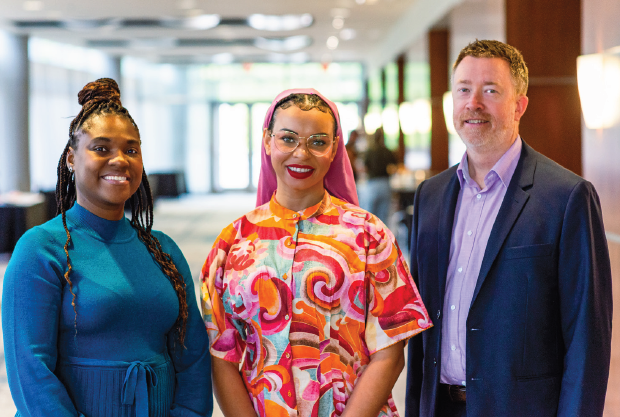2025 MSEA Racial Social Justice Summit – Maryland State Education Association

2025 MSEA Racial Social Justice Summit Report
Introduction
The Maryland State Education Association (MSEA) hosted its Annual Racial Social Justice Summit on May 3, 2025. The event was organized by MSEA’s Human and Civil Rights Committee, chaired by Kierre Vinson and Jorge Córdoba. The summit prominently featured Blair Imani, a critically acclaimed historian, author, educator, and social justice influencer, as the keynote speaker.
Keynote Speaker: Blair Imani
- Blair Imani is the author of Read This to Get Smarter: about Race, Class, Gender, Disability, and More and Making Our Way Home: The Great Migration and the Black American Dream.
- She is the creator of Smarter in Seconds, a platform that shares engaging content on intersectionality, race, and social justice.
- Imani is dedicated to amplifying the voices of marginalized communities, aligning with the Sustainable Development Goals (SDGs) by promoting inclusive education (SDG 4), reducing inequalities (SDG 10), and fostering peaceful and inclusive societies (SDG 16).
Workshops and Educational Sessions
The summit featured various workshops addressing critical social justice topics, including:
- Mutual Aid Networks – fostering community support and resilience (SDG 11: Sustainable Cities and Communities).
- The history of unions and their relationship with racial social justice – promoting decent work and economic growth (SDG 8).
- The criminalization of Black girls – addressing systemic inequalities and promoting gender equality (SDG 5 and SDG 10).
- The power of picture books in creating inclusive classrooms – enhancing quality education and reducing inequalities (SDG 4 and SDG 10).
Impact and Feedback
- MSEA President Paul Lemle emphasized the summit’s role in equipping educators and activists with vital knowledge, stating that the union serves as a key organizing agent for addressing issues affecting students and communities.
- Attendees highlighted the value of the knowledge shared, the expertise of presenters, and the opportunity to network and collaborate with fellow educators.
- Participants expressed enthusiasm for Blair Imani’s work and the new perspectives gained through the summit.
Alignment with Sustainable Development Goals (SDGs)
- SDG 4: Quality Education – The summit promoted inclusive and equitable quality education through workshops and resources aimed at educators.
- SDG 5: Gender Equality – Addressing the criminalization of Black girls and promoting gender justice.
- SDG 8: Decent Work and Economic Growth – Exploring the role of unions in advancing social justice and fair labor practices.
- SDG 10: Reduced Inequalities – Focusing on racial and social justice to reduce disparities in education and society.
- SDG 11: Sustainable Cities and Communities – Encouraging mutual aid and community support networks.
- SDG 16: Peace, Justice, and Strong Institutions – Promoting peaceful and inclusive societies through education and activism.
Conclusion
The 2025 MSEA Racial Social Justice Summit successfully advanced the goals of social justice and equity in education. By centering marginalized voices and providing educators with critical tools and knowledge, the summit contributes directly to the achievement of multiple Sustainable Development Goals. The event underscores the importance of unions and educational institutions as leaders in fostering inclusive, equitable, and just communities.
1. Sustainable Development Goals (SDGs) Addressed or Connected
- SDG 4: Quality Education
- The article focuses on education, educators, and workshops aimed at social justice and inclusivity in classrooms.
- SDG 5: Gender Equality
- Issues of gender, including the criminalization of Black girls, are discussed.
- SDG 10: Reduced Inequalities
- The summit addresses racial social justice, amplifying marginalized voices, and combating inequalities.
- SDG 16: Peace, Justice and Strong Institutions
- Focus on civil rights, history of unions, and social justice aligns with promoting peaceful and inclusive societies.
2. Specific Targets Under Those SDGs
- SDG 4: Quality Education
- Target 4.5: Eliminate gender disparities and ensure equal access to all levels of education and vocational training for vulnerable populations.
- Target 4.7: Ensure that all learners acquire knowledge and skills needed to promote sustainable development, including through education for human rights and gender equality.
- SDG 5: Gender Equality
- Target 5.1: End all forms of discrimination against all women and girls everywhere.
- Target 5.5: Ensure women’s full and effective participation and equal opportunities for leadership at all levels.
- SDG 10: Reduced Inequalities
- Target 10.2: Empower and promote the social, economic and political inclusion of all, irrespective of age, sex, disability, race, ethnicity, origin, religion or economic or other status.
- SDG 16: Peace, Justice and Strong Institutions
- Target 16.6: Develop effective, accountable and transparent institutions at all levels.
- Target 16.b: Promote and enforce non-discriminatory laws and policies for sustainable development.
3. Indicators Mentioned or Implied to Measure Progress
- Indicators related to SDG 4 (Quality Education)
- Proportion of schools implementing inclusive curricula that address race, class, gender, and disability (implied through workshops and educational content).
- Participation rates in educational workshops and training on social justice topics.
- Indicators related to SDG 5 (Gender Equality)
- Rates of criminalization or disciplinary actions against Black girls in schools (implied by the workshop on criminalization of Black girls).
- Representation of women and girls in leadership roles within educational and social justice organizations.
- Indicators related to SDG 10 (Reduced Inequalities)
- Measures of inclusion and participation of marginalized communities in educational and social justice activities.
- Data on racial disparities in education and social outcomes.
- Indicators related to SDG 16 (Peace, Justice and Strong Institutions)
- Number of policies or programs implemented by unions and institutions to promote racial social justice.
- Levels of awareness and knowledge among educators and activists about civil rights and social justice issues.
4. Table of SDGs, Targets, and Indicators
| SDGs | Targets | Indicators |
|---|---|---|
| SDG 4: Quality Education |
|
|
| SDG 5: Gender Equality |
|
|
| SDG 10: Reduced Inequalities |
|
|
| SDG 16: Peace, Justice and Strong Institutions |
|
|
Source: marylandeducators.org








